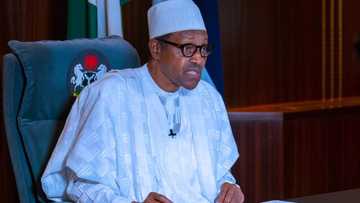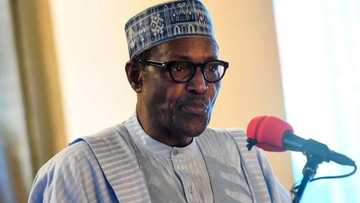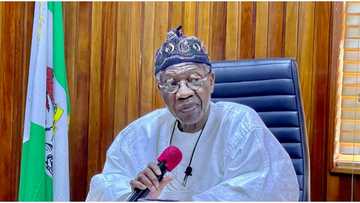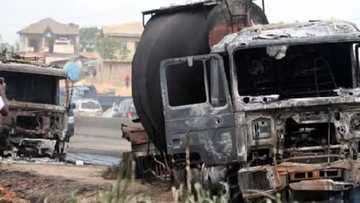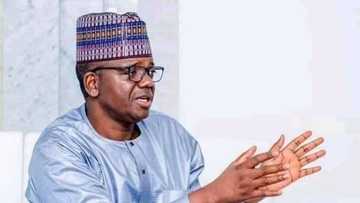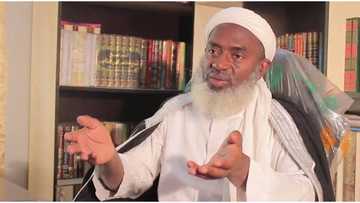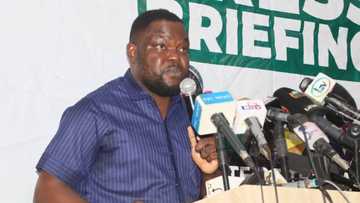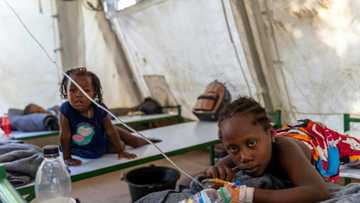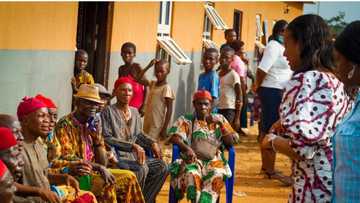How Lack of Ventilators in Abuja Govt Hospitals Killed HIV Patient Transferred From Dubai Within 48hrs
Apparently disturbed by the death of a 33-year-old HIV patient, Ngozi (real name not disclosed) who was transferred from Dubai to Nigeria and the agony of many Nigerians who are in need of medical rescue in many government hospitals, a medical practitioner in Abuja, Dr Daniel Abdu, shares his experience.
PAY ATTENTION: Click “See First” under the “Following” tab to see Legit.ng News on your Facebook News Feed!
In a document sent to Legit.ng, Dr Abdu, who is a member of InstaMedic Healthcare, said that on October 7, Ngozi, who had been living in Dubai for around three years, was to be transferred to the National Hospital in Abuja due to HIV-related complications.
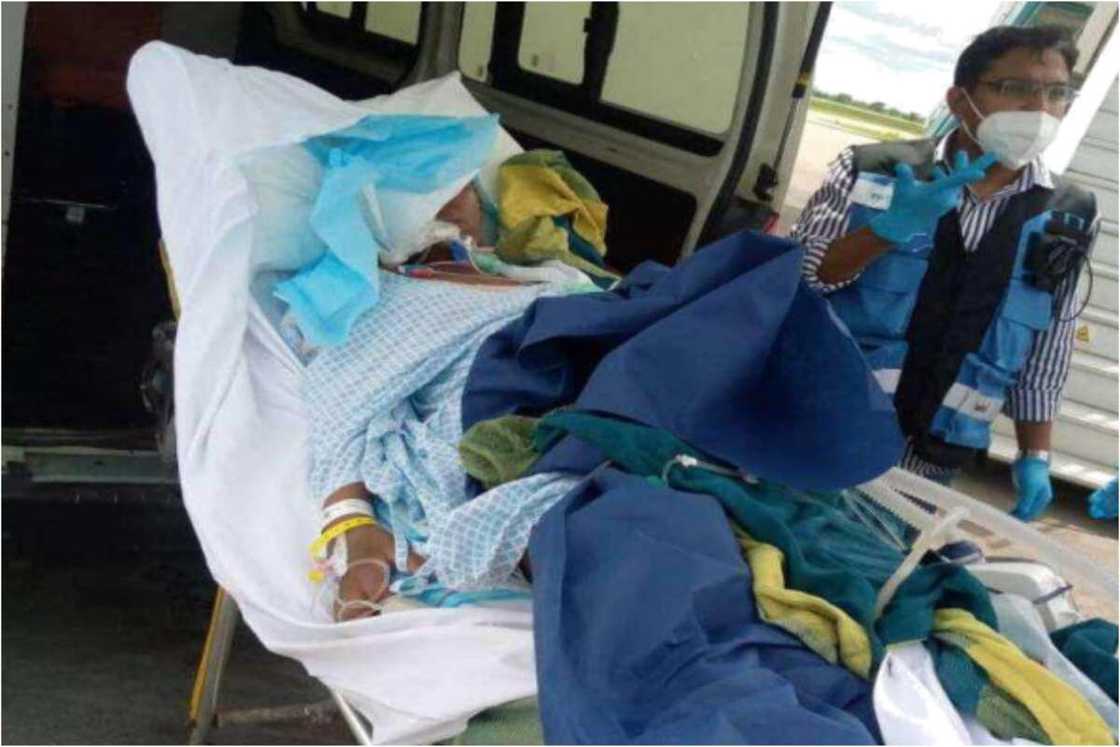
Source: UGC
But he lamented that the lady died less than 48hrs as a result of the poor attention given to her at the government hospital.
He said before Ngozi’s transfer, she had been receiving medical care at the King’s College Hospital in Dubai for some months.
According to him, she was transferred to Nigeria because Dubai has limited access to the required medications due to the country’s conservative culture.
PAY ATTENTION: Share your outstanding story with our editors! Please reach us through info@corp.legit.ng!
Dr Abdu noted that InstaMedic Healthcare partners with Blue Dot team, Dubai, a health care service provider involved in medical tourism and international medical transfer of patients among African countries, UAE and others.
Speaking with Legit.ng on the incident on Thursday, November 3, Dr Abdu noted that despite the complications Ngozi suffered, she would have been alive if Nigeria’s health care system had made adequate provision for patients with clinical illnesses, particularly those who needed a social support system.
He said if a country like Dubai could effectively cater to the medical needs of the deceased for many months, Nigeria, where the deceased could have easily accessed the medical assistance she needed, could have done much more.
Ngozi would have remained alive
He stated:
“I believe she would have survived if the needed attention was given to her by government hospitals. It is sad that when patients need critical attention, hospitals give flimsy excuses in order to reject them.
“They will not do the right thing to rescue the life of the patient that is in danger. Imagine that government hospitals in Abuja don’t have more than 12 ventilators, and it is very hard to find an ambulatory ventilator should a patient decide to move from one hospital to another in a critical state.”
Dr Abdu explained that when he was first informed about Ngozi’s repatriation from Dubai to a public hospital in Abuja on September 1, he had swiftly set plans in motion to aid the transfer.
According to him, the patient’s medical report was sent to the National Hospital, Abuja, and the hospital managers agreed to continue the care of the patient.
“As required of a formal transfer system of patients from one country to another following international medical travel standards and internal protocols, a receiving hospital is expected to be notified ahead and well informed on the need to make ready logistics for the care of the said patient. The reasons for the transfer of the patient were adequately discussed with the Nigerian High Commission in Dubai.
“Due to the worsening prognosis and consideration for the need of getting essential medications which were more readily available in Nigeria than in Dubai, amidst other factors, a need for transfer to a government facility in Nigeria was facilitated.
“The National Hospital was notified on September 8, 2022, of the need for repatriation to receive the patient. They were also told about the need to draft an acceptance letter for further processing of travel documents and to meet up with the internal protocols of the Blue Dot Team for the transfer of patients.
“An informal letter and positive verbal responses from the hospital managers of the National Hospital were obtained, showing both willingness and readiness to continue care of this patient in the said hospital following the medical report sent.
“The National Hospital could not write out a formal letter as an acceptance letter since they felt the referring institution did not officially direct a letter of request to them, aside from the medical report of the said patient that was to be transferred. However, the managers of the National Hospital, including the duty manager, HOD of Family Medicine and CMAC, said since the patient to be received was a Nigerian citizen, she would be well attended to at the hospital arrivals.”
He said that paper documentation and other verification exercises were commenced following the assurance of the National Hospital, and Ngozi arrived at the Nnamdi Azikiwe Airport in Abuja on October 7, 2022, by 1 pm.
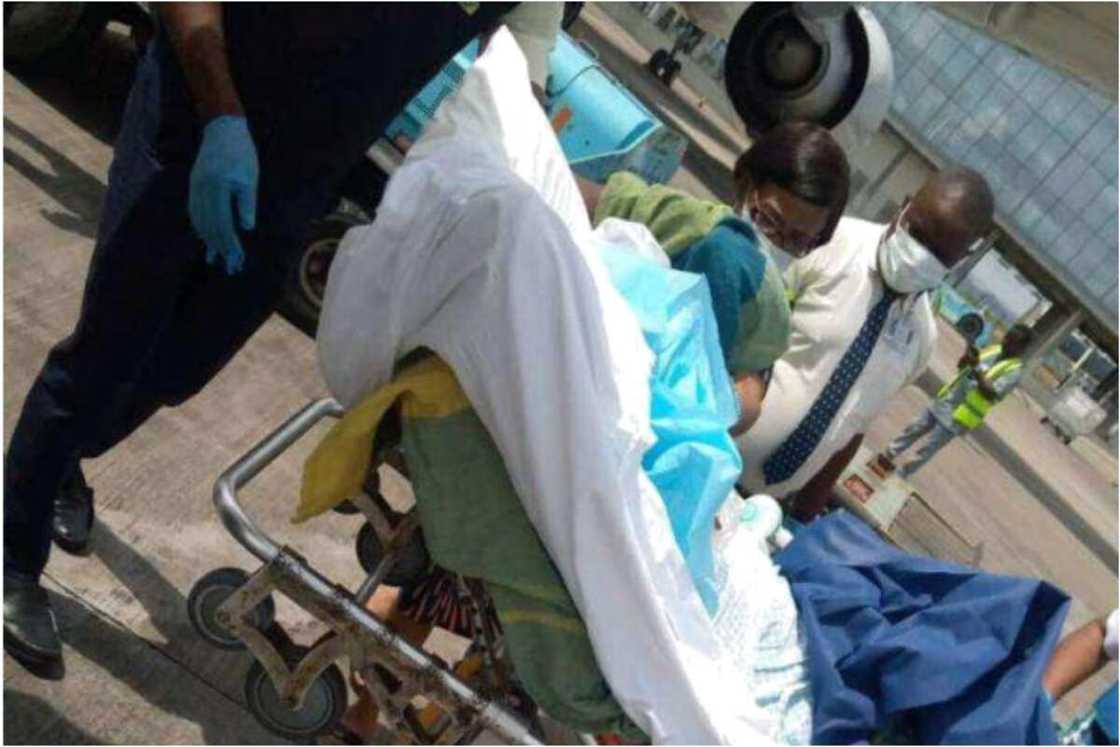
Source: UGC
Dr Abdu, however, lamented that the ambulance that received the patient at the airport did not have ventilatory support, so the patient was transferred with a mobile ventilator to the National Hospital in the company of the BlueDot team.
According to the doctor, when the transfer team got to the hospital’s emergency room around 2:30 pm, no effort was made by the hospital to attend to the patient, as she was left in the ambulance.
He further reiterated that to worsen the situation, the manager on duty said the hospital would not admit the patient because she had not received any phone call about the patient on that particular day.
He said the development came as a surprise because two days before the patient got to Nigeria, he had gone to the National Hospital to tell them about the patient’s arrival, with emphasis on the need for a seamless transfer.

Read also
Insecurity: Powerful PDP lawmaker wants Nigerians to carry ammunition, says President Buhari failed
Dr Abdu stressed:
“While being at the ER on the arrival date, I had to restate that a necessary arrangement had been done for this patient before arrival, and possibly, we could still get a makeshift arrangement to be given for her care at the National Hospital due to her critical state.
“It was at this point that the ER team bothered to make an assessment of the patient who was still in the ambulance, to know if they could still take this patient for admission.”
Efforts to seek alternative hospital began
“At this point, the further effort made by the ER was to reach out to the anaesthetic team on call, whom they had been trying to reach via phone but was not answerable, hence they had to search for him within the hospital premise while I still made efforts to escalate to other hospital managers on the need action by the hospital.
“Efforts were stepped up to still ensure that the National Hospital took this patient, as this was clearly an emergency case and further transfer might worsen the clinical outcome. There had not been a feasible alternative arrangement to receive this critical patient in the ambulance.”
He said after futile attempts to make the hospital admit the patient, the transfer team was advised to seek an alternative hospital because the only two ventilators available at the National Hospital were in use at the time.
Dr Abdu noted that at about 4 pm, the registrar in the anaesthetic department came to the ambulance to review the patient while still being on a mobile ventilator that was being run on a power bank with a battery life of 3 hours.
He explained further:
“The registrar of the anaesthetist team on call told us that there was a bed space in the intensive care unit. However, there was no ventilator for us, as only two ventilators in the hospital were in use.
“This was escalated to the head of the department of emergency operations, who asked us to seek alternative options to transfer her to another facility that might have ventilators.”
Dr Abdu later reached out to other government hospitals in Abuja for the possibility of receiving the patient but they all rejected Ngozi either because there was no ventilator or the available ones were in use.
After all efforts, he said the next available option was to use a private facility in Abuja, adding that the transfer team resorted to taking her to a nearby private health centre.
He said before then, they had to discuss with a donor from Dubai who volunteered to release some funds for the patient’s care in Nigeria.
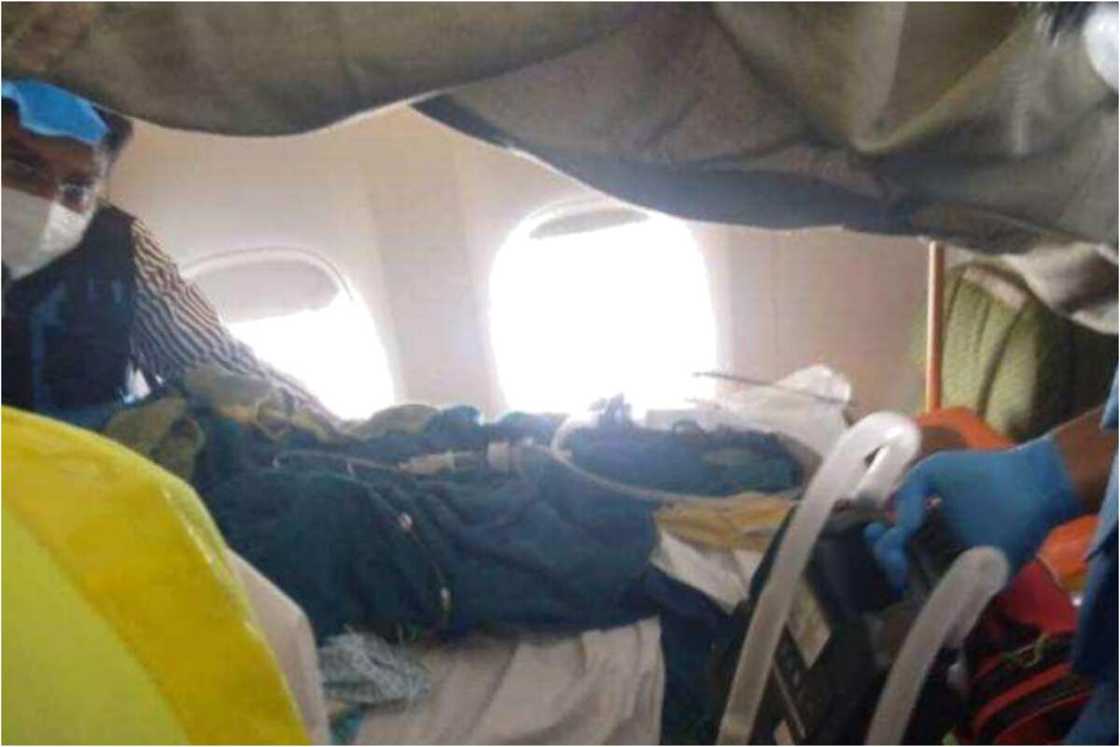
Source: UGC
The donor however declined that the funds would not be sustainable except the patient’s relatives stepped in.
Dr Abdu noted:
“Due to the urgency of the situation, a resolution was made at 4:10 pm to transfer the patient to a nearby private hospital in Abuja with the available limited funds as other solutions of getting an ambulance with ventilatory support, should the mobile ventilator go off, wasn’t feasible.
“She was successfully transferred to Limi Hospital ICU at 5 pm that same day with a financial commitment of N250,000 out of the N1.5 million that was meant to be the initial admission deposit.”
Ngozi’s family can’t be reached as funds remain unsustainable
Dr Abdu said the problems arising from the unavailability of relatives and the unsustainability of funds were escalated appropriately to the Garki Police Division.
After deliberations on the next line of action, the Divisional Crime Officer (DCO) concluded that it was a civil case and doctors should do the needful for the patient as expected.
He stated:
“The questions to answer are: would Limi Hospital continue ventilatory support to the patient despite the fact that funds were no more forthcoming and the relatives have decided to withdraw support or would more funds be made available for continued care in a private facility by the donor or would relatives decide to turn up for her, and finally if answers to these questions were not gotten what would be our next line of action?
“I had to reach out to lawyers on a voluntary basis to know our best possible options as it was a weekend and it is difficult getting the attention of most regular government workers. However while trying to draft out the next possible options and due to the challenge of funds, the patient was referred from Limi Hospital back to National Hospital for the possibility of an extension of car.
How Ngozi was rejected again
He said while the transfer team was working on the possible options, the patient was referred back to the National Hospital on October 8 due to the challenge of funds.
The transfer team had to make the relatives aware of the implications of their refusal to support her and how a lack of funds could lead to her demise.
Dr Abdu further stated:
“Blue Dot team reached out to Mr Chinedu, who said from his viewpoint, the larger family had presumed her dead and as such did not want to make any financial contribution.
“Due to the unavailability of a mobile ventilator and the unavailability of the ambulance with an oxygen cylinder at that point in time, a poorly equipped private ambulance was hired to transfer the patient to the National Hospital.”
It was painful, according to Dr Abdu that at the National Hospital, the patient was rejected for the second time and was referred to the University of Abuja Teaching Hospital (UATH).
He said:
“On arrival at the National Hospital at about 4:30 pm on October 8, communication was re-established following the earlier logistics made with them on the need to expedite actions to admit her and give her a chance for survival.
“The patient was noted to still make spontaneous respiratory efforts off the ventilator with the tracheostomy tube in-situ with the following vital signs as assessed: 1 pulse rate, 137bpm, and spo2 as 95% in room air.
“The National Hospital declined to receive the patient again after making her wait in the ambulance for 2 hours. We were told to go to the University of Abuja Teaching Hospital, which was an hour and 30 minutes by road from the hospital.
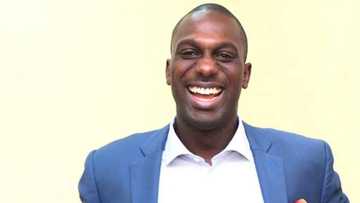
Read also
Ayo Owodunni: Nigerian man becomes first black councillor of Canadian city, contest against 4 candidates
“On arrival at the University of Abuja Teaching Hospital at about 7:30 pm, we were received at the medical emergency, but the patient was still kept in the ambulance for another two hours for some internal discussions among the medical team on call for the possibility of receiving the patient for treatment at the UATH.”
The UATH also refused to admit Ngozi because they would not want to take a patient with a long-term illness, and while they admitted that the patient was unstable and needed an emergency intervention, they said it was best to have the National Hospital attend to her.
He further said:
“Note that she had been in the private ambulance since 4 pm that same day following the referral from Limi Hospital, and by 9 pm she was still in the ambulance without ventilatory support, oxygen or IV fluids.
“This private ambulance had roughly charged N60,000 for her transfer. A decision had to be hurriedly made as the fund for a private ambulance was getting exhausted at around 9:30 pm and the managing team were getting worn out.
“Option of further transfer back to the National Hospital from UATH wasn’t a feasible one following the repeated attempts made with the National Hospital earlier.
“A decision made in order to avoid unnecessary procurement of bills and due to unavailability of funds was to have the patient managed in my private residence. From 10:30 pm, there were limited options due to several constraints. IV fluids and other basic nursing care services were immediately provided while efforts were ongoing for appropriate escalation.”
Efforts proved abortive as the patient dies on the way to FMC Jabi
According to Dr Abdu, around 9:20 pm on October 9, while on IV fluids, the patient was mobilised to be transferred to FMC Jabi, saying that while on motion, Ngozi was noted not to make a respiratory effort, and was unresponsive to call with cold clammy extremities and that CPR was immediately commenced while on transfer to FMC Jabi.
He said:
“On arrival at FMC Jabi, she was assessed as a case of Brought In Dead (BID) by the medical team on call (MTOC) and was advised to be transferred to the mortuary.”
“Bills for transfer to the mortuary was immediately sourced for, collated and paid, to include embalming while making efforts to update relatives on the recent developments as well as escalating to authorities
He stated that after sourcing for and paying the bills for transfer to the mortuary, efforts were made to update the deceased relatives and the appropriate authorities on the development.
According to him, the Nigeria Police was re-informed involving the DPO, DCO I and DCOII, at Life camp division about this incident where some of the Police officers on duty personally made effort to reach out to Mr Chinedu on this incident. Communication was however futile as Mr Chinedu ended that conversation abruptly thereby necessitating a book entry to be opened with a book entry number as 37
He said following its inability to get the family’s cooperation, the transfer team notified the mortuary that any concern on the corpse should be channelled to the relatives directly.
Expressing sadness over the incident, Dr. Abdu asks:
“What are the prospects of Nigerian citizens who cannot afford health care services that needed critical interventions? Can health service providers have inter-communication to be able to foster the transfer of patients seamlessly instead of caregivers these responsibilities to caregivers to find out hospitals with available spaces.
“Can we get mobile ventilators and or equip more centres to acquire ventilators, including other states of the federation? How promptly can medical emergencies on weekends be attended to by government facilities? How many ambulances can be equipped with life support facilities, including trained personnel? What are the protocols involved in the management or transfer to critical patients who are indigent as Nigerians?
Our goal is to have first heart transplant in Nigeria, Tristate boss Adeleke reveals
Meanwhile, Legit.ng had previously reported that the president and chief executive officer of the Tristate health care system, Prof. Kamar Adeleke, explained that Nigeria has what it takes to cater for the health of her citizenry.
It was reported that Adeleke, a US-trained interventional cardiologist, made this known on Friday, July 22, during a media interaction in Lagos.
He said he came to Nigeria after spending over 40 years in the US to make the cardiac programme affordable and accessible to the people, saying that he is keen on making the first heart transplant in Nigeria.
Source: Legit.ng



